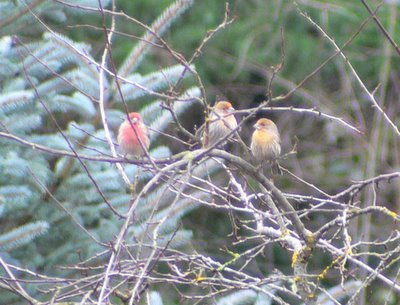"...a pageant of triumph as each star, free from confusion, sweepeth free in his right orbit..."
As I was leaving work yesterday, I was visited by a cute little red house finch...
after a friend had a similar experience, and reflecting on how we had experienced synchronicities related to cardinals since I left Hawai'i, I decided to look for symbolism in this new little buddy.
The first link I found was from "The New Dharma Bums: Bird Lore" ...and for allegorical fun, I decided to add some hypertext links back to entries from my own journal, which seemed to relate rather appropriately:
"The red or yellow color of a male House Finch comes from pigments that it gets in its food during molt. The more pigment in the food, the redder the male. Females prefer to mate with the reddest male they can find, perhaps assuring that they get a capable male who can find enough food to feed the nestlings.
If I had any energy whatsoever I would write something about sexual and reproductive preference based on greater access to resources not being solely limited to bird behaviors. Or how the whole concept of race and pigmentation permeates every aspect of our society, even though it's genetically insignificant."

While contemplating this, I begin to think about the concepts of love, as well as living systems in general.
I also found two claims to the Finch family motto:
"Nil conscire sibi" ("Conscious of no evil" or "To have a conscience free from guilt"). &
"Aperto vivere voto" ("To live without a wish concealed" or Live for your dreams") ...incidently, this ties back into the cardinal symbolism, but I digress...
Perhaps the most obvious reference would be the famous line by Atticus Finch, from To Kill A Mockingbird: "If you can learn a simple trick, Scout, you'll get along a lot better with all kinds of folks. You never really understand a person until you consider things from his point of view, until you climb inside of his skin and walk around in it"
This line reminds me of a sentiment that I share in my explanation of what inspired me to start the community Areopagus... quoting from Milton's Areopagitica and the Modern First Amendment, by Vincent Blasi:
"In fact, I regard as possibly the two most important pages I have ever read the passage in On Liberty in which Mill argues, from Cicero (whose closest friend and supporter was named Atticus), that a person should strive to understand his opponents' ideas with greater imagination and sympathy than he devotes to knowing his own. If every advocate and every scholar would only reread those pages before entering the lists, the world would be a better place."
after a friend had a similar experience, and reflecting on how we had experienced synchronicities related to cardinals since I left Hawai'i, I decided to look for symbolism in this new little buddy.
The first link I found was from "The New Dharma Bums: Bird Lore" ...and for allegorical fun, I decided to add some hypertext links back to entries from my own journal, which seemed to relate rather appropriately:
"The red or yellow color of a male House Finch comes from pigments that it gets in its food during molt. The more pigment in the food, the redder the male. Females prefer to mate with the reddest male they can find, perhaps assuring that they get a capable male who can find enough food to feed the nestlings.
If I had any energy whatsoever I would write something about sexual and reproductive preference based on greater access to resources not being solely limited to bird behaviors. Or how the whole concept of race and pigmentation permeates every aspect of our society, even though it's genetically insignificant."

While contemplating this, I begin to think about the concepts of love, as well as living systems in general.
I also found two claims to the Finch family motto:
"Nil conscire sibi" ("Conscious of no evil" or "To have a conscience free from guilt"). &
"Aperto vivere voto" ("To live without a wish concealed" or Live for your dreams") ...incidently, this ties back into the cardinal symbolism, but I digress...
Perhaps the most obvious reference would be the famous line by Atticus Finch, from To Kill A Mockingbird: "If you can learn a simple trick, Scout, you'll get along a lot better with all kinds of folks. You never really understand a person until you consider things from his point of view, until you climb inside of his skin and walk around in it"
This line reminds me of a sentiment that I share in my explanation of what inspired me to start the community Areopagus... quoting from Milton's Areopagitica and the Modern First Amendment, by Vincent Blasi:
"In fact, I regard as possibly the two most important pages I have ever read the passage in On Liberty in which Mill argues, from Cicero (whose closest friend and supporter was named Atticus), that a person should strive to understand his opponents' ideas with greater imagination and sympathy than he devotes to knowing his own. If every advocate and every scholar would only reread those pages before entering the lists, the world would be a better place."